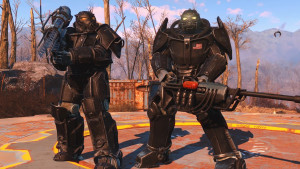Please support Game Informer. Print magazine subscriptions are less than $2 per issue
Opinion – EA Should Delay Titanfall 2

Delaying a game is never an easy choice for a publisher or developer. Doing so creates a domino effect of replanning, from amended SEC filings and quarterly financial projections to rescheduled ad buys and postponed talent transitions to new projects. But sometimes it’s better to take that early hit for the sake of the long-term viability of a game or franchise. EA should seriously consider making this tough decision with Titanfall 2.
The Titanfall franchise seems poised to entrench itself as a sustainable franchise in the intensely competitive shooter genre. Respawn’s first game won many accolades from critics thanks to its frenetic combat and interesting pilot/titan dynamic, attracting an impressive 10 million unique users via sales and free EA Access sessions. But the game also lacked the staying power of many competitive shooters due to its underdeveloped progression system. The sequel, due October 28, addresses this shortcoming and adds an oft-requested single-player campaign as well. Our early impressions of both the multiplayer and single-player are strong, but being a good game doesn’t guarantee success. So what’s the problem?
Competition. Conventional thinking in the video game market contends the holiday is the best time to release a game, but window in which EA wants to launch the game is a murderer’s row of high-profile shooters with strong communities and deep financial backing. Look at this release gauntlet:
Destiny: Rise of Iron – September 20
Gears of War 4 – October 11
Battlefield 1 – October 21
Titanfall 2 – October 28
Call of Duty: Infinite Warfare – November 4
Rising above (or standing shoulder to shoulder with) this formidable group won’t be easy. Destiny is currently the most popular game on GameInformer.com; every article we write about the base game and its expansions drives an incredible amount of traffic our way. Gears of War 4 has the marketing power of a platform holder at its back and a fiercely loyal fanbase waiting fervently to jump back into the fray. EA’s own FPS juggernaut, Battlefield, is quizzically scheduled to launch a mere week before Titanfall 2. Releasing the game a week after Battlefield 1 needlessly pits two of its own games in a battle for players’ wallets. And which do you think has more marketing dollars at its disposal – the internal franchise that EA considers a pillar of its library, or the second game in a series made by an external developer?
EA also can’t ignore Call of Duty, the series Respawn’s founders originally put on the map. Though Infinite Warfare has received its share of hate for the space setting, no main entry in Activision’s billion-dollar franchise has sold less than 20 million copies since 2008. This is no doubt bolstered by the entrenched professional gaming leagues that have formed around the franchise. Even if Infinite Warfare is a downward tick from Black Ops III, which according to NPD was the best-selling game of 2015, it won’t be a precipitous fall off a cliff. You can guarantee that considering so many people will buy that game simply for the remastered version of Call of Duty 4: Modern Warfare. Essentially, Respawn is directly competing with the most popular game its developers ever made.
One more wild card may also make standing out in this crowded space even more difficult: Overwatch. Blizzard’s hero shooter is the early frontrunner for shooter of the year, and it’s proven a hit with both console and PC gamers. The game already cracked 10 million users since its May release, and we have no doubt that Blizzard has some disruptive content scheduled during this window to keep its daily users invested. We wouldn’t be surprised to see Halloween-themed loot boxes with new skins that players either have to buy or play hours upon hours to acquire.

In the aftermath of last weekend’s Tech Test, Titanfall 2 is also facing questions from within the community about some of the creative decisions Respawn made that deviate from the original game. Some bemoaned the slightly slower combat, while others are unimpressed with the map designs or angered that their favorite mode, Attrition, is gone. Respawn addressed some of those concerns with a blog post earlier today, announcing plans to speed up the pilot movement again and tweak the time it takes to secure a titan.
Taking all these factors into consideration, I have a tough time understanding why EA would force its young franchise to compete in such a crowded space. The allure of releasing during holiday to take advantage of the uptick in consumer spending is strong, but you also have to be aware of the circumstances surrounding the game. Were the game pushed back to early 2017, it could benefit greatly from being the lone top-tier shooter in the arena, garnering a significantly larger portion of press and streaming coverage while avoiding the unnecessary bloodshed of joining a knife fight with five other big-name franchises.
The developers at Respawn have one of the most impressive oeuvres in all of game development, with generation-defining shooters like Medal of Honor: Allied Assault and Call of Duty 4: Modern Warfare among their credits. Titanfall 2 has a chance of being great, but it would be a shame to see a promising franchise meet an early demise due to poor planning. EA should look honestly at the heavy competition, think hard about the franchise’s long-term value, and make that tough call.










